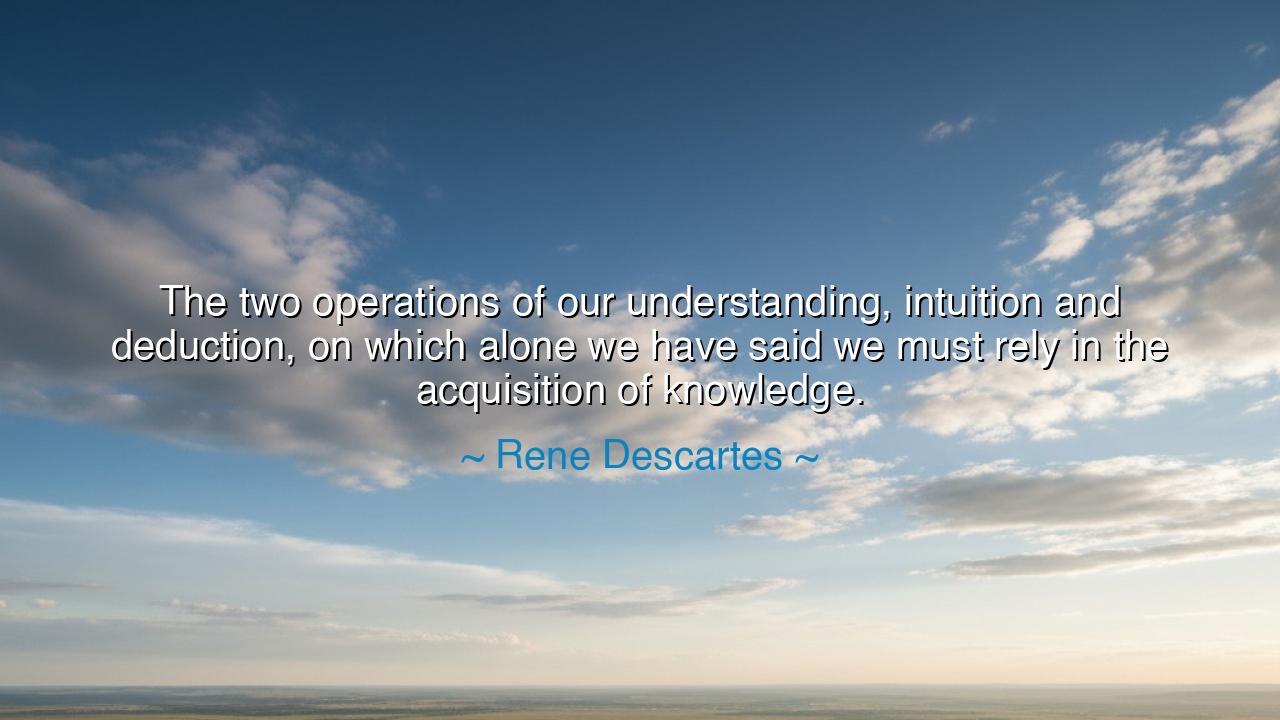
The two operations of our understanding, intuition and deduction
The two operations of our understanding, intuition and deduction, on which alone we have said we must rely in the acquisition of knowledge.






In the immortal words of René Descartes, the father of modern philosophy, we find this profound declaration: “The two operations of our understanding, intuition and deduction, on which alone we have said we must rely in the acquisition of knowledge.” These words, written in the Rules for the Direction of the Mind, stand as a pillar of human thought—a reminder that all wisdom begins in clarity of perception and the discipline of reasoning. Descartes, who sought truth amid the chaos of uncertainty, laid down a law for all who would pursue understanding: that knowledge is born not of chance or authority, but of intuitive insight and logical deduction. He called upon humanity to think with both the fire of intuition and the structure of reason, for only when these two forces unite can the mind ascend toward truth.
René Descartes, living in the seventeenth century—a time of war between faith and reason, religion and science—became a bridge between worlds. His age was one of great confusion, where knowledge was tangled in superstition and blind obedience. Yet Descartes dared to begin anew, to strip away everything uncertain and stand upon what could not be doubted. From this stance was born his method, his cry of cogito, ergo sum—“I think, therefore I am.” But beneath that mighty declaration lay this gentler foundation: that the operations of understanding—intuition and deduction—are the twin paths of knowledge. Without intuition, reason is blind; without deduction, intuition is fleeting. Together, they form the light and law of the intellect.
When Descartes speaks of intuition, he does not mean the vague impulse of emotion, but the clear, self-evident perception of the mind. It is the spark of certainty that flashes when truth is seen directly, needing no proof. It is how we grasp the simplest truths—that two and two are four, that the whole is greater than the part, that existence cannot come from nothing. Intuition is the eye of the soul, which perceives what is beyond the veil of words. Yet intuition alone is not enough, for it must be guided and tested, lest it wander into illusion. Thus comes deduction, the patient and noble art of drawing from what is known that which must also be true. If intuition is the seed, deduction is the root that grounds it and the branch that extends it toward greater understanding.
History itself bears witness to this eternal balance. Consider Isaac Newton, the great physicist and heir of Descartes’ method. When he saw an apple fall, it was intuition that whispered to him that the same force which drew the fruit to the earth must bind the moon to the sky. Yet it was deduction—the labor of years, the rigor of calculation—that proved the law of gravity to be true. Newton’s insight was the flash of the divine; his reasoning was the instrument of man. Thus, the harmony between intuition and deduction gave birth to one of the greatest revelations in human history. So it has ever been: intuition ignites the flame, deduction tends it into enduring light.
The ancients knew this truth, though they spoke it in different tongues. Plato called intuition the vision of the Forms—the direct apprehension of what is eternal and perfect. Aristotle, his student, taught the necessity of logic, of syllogism, of reasoning from premise to conclusion. What Descartes did was unite these two in a single method, a sacred marriage of clarity and order. He gave the world a framework for all learning—a way to separate the certain from the uncertain, the light of truth from the shadows of mere opinion. To think as Descartes thought is to hold the universe to the measure of reason, yet to trust also the divine clarity that arises from within.
In our own age, the wisdom of Descartes remains ever urgent. The world is crowded with noise—opinions shouted louder than truth, data overflowing without understanding. Many think much, but few see clearly. Descartes calls us to return to the source of knowledge within ourselves, to cultivate the stillness of intuition and the discipline of reason. Before accepting what others declare, we must ask: Do I perceive this clearly? Does it follow necessarily from what is true? To live by these questions is to walk the ancient path of philosophers and scientists alike—a path that leads not to confusion, but to the serenity of understanding.
The lesson, then, is clear: seek truth through the twin powers of intuition and deduction. Do not be content with borrowed knowledge or shallow impressions. When faced with a question, pause and look inward—let intuition reveal the essence of the matter, then let deduction test and shape it. The heart must see, but the mind must measure. For wisdom is not the possession of information, but the union of insight and reason—the harmony of the divine and the rational within the soul.
So remember this, O seeker of wisdom: the mind, like the universe, was made to move in balance. Trust the clarity that dawns within you, but guard it with logic. Let your thoughts be both flame and foundation. In the words of René Descartes, who sought truth above all else, know that understanding rests upon two sacred pillars—intuition and deduction—and from these alone is the kingdom of knowledge built.






AAdministratorAdministrator
Welcome, honored guests. Please leave a comment, we will respond soon